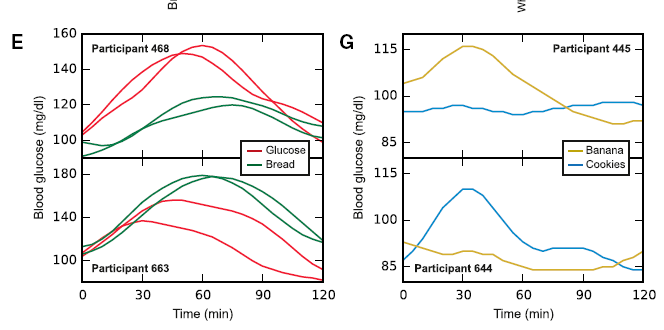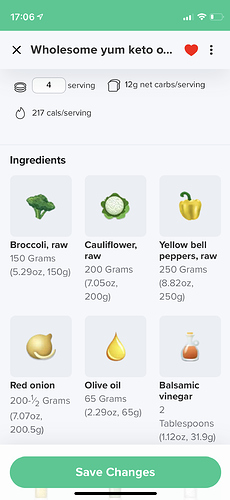Hi Shinita…attached photo of raw quantities added…does the carb content reduce once cooked?
60g of carbs and still in keto?
Wow, thanks. Well, it must be those red onions. Broccoli, cauliflower, peppers, olive oil, vinegar… these are all rather low carb (especially after fiber) plant ingredients. Based on a quick nutrition search re: red onions, they are likely spiking the carb count.
I’m not suggesting you’re eating too much carbs, but if you’re trying to reduce, I’d cut way back on the onions. We use them sparingly and focus on above-the-ground veggies - which tend to be far more “keto friendly” than roots.

The carb content doesn’t change but the carb content per 200g definitely does if the veggies lose much water.
It’s a very onion-y dish  I love onions but as time passed, I used them less and less. It’s very flavorful so a little goes a long way. But not everyone needs to go very low with carbs
I love onions but as time passed, I used them less and less. It’s very flavorful so a little goes a long way. But not everyone needs to go very low with carbs  To me, ketosis isn’t enough, I must go lower. Or just use less plants, who knows? I changed multiple things when the good changes happened. But I kept my onions, I just use them occasionally and in small amounts. Almost only when really needed like in stews.
To me, ketosis isn’t enough, I must go lower. Or just use less plants, who knows? I changed multiple things when the good changes happened. But I kept my onions, I just use them occasionally and in small amounts. Almost only when really needed like in stews.
Agreed that reducing water content doesn’t inherently reduce the carb content. However, cooking (heat) likely does. Much in the way that fermenting reduces carbs (the bacteria convert a portion of the carbs into CO2), I would imagine that cooking onions would reduce the carb content to some extent.
Science or fantasy?
It’s too deep for me but I doubt it’s significant. We already can’t know things exactly. I don’t even measure ketones or BS or whatever. I don’t even feel if I am in ketosis, it’s the same to me. I just track sometimes and try to figure out what kind of eating results in me feeling good…
But this is an interesting thought… And it complicates already complex things. Different type of carbs already may feel different… I never noticed it affects ketosis but as I only rarely felt if I am in ketosis, it means little. But it surely affects how I feel. More or less pure sugar (but something significant, not like onion but sweet fruits) alone is the worst, not surprisingly. I can’t imagine getting sugar poisoned from onions… Getting out of ketosis, maybe if I go crazy… (My ketosis carb limit seemed to be around 40-45g when I still could tell when I went in and out.)
I’m not trying to stay strictly “keto”, I love the keto ideology…as in I’ve had blips of that clear and focussed feeling and I want more, but what I’ve found is that since upping the carbs to that extent I’ve felt at a much better level.
I’ll carry on experimenting in the future but at the moment I’m really busy with work and it’s working for me so I’ll crack on as is just to be on the safe side. I know everyone’s nutritional requirements are different, I’ve chased the keto way for a long time and appreciate the advice about ditching onions but onions are my bff’s at the mo!
I surely wouldn’t keep myself from my dear onions. Or fruits… sigh. I tried (just temporarily but in fruit season) but it’s futile.
I am merely lucky to be able to be content with little but if someone needs much and works well with a higher carb intake, that’s cool too 
I am 38yo and regularly eat as much as 60g net carbs, sometimes more, and I have still enjoyed huge benefits from dramatically lowering my carbs, and increasing both fat and protein: more satisfying food, less sugar and junk cravings, less bloating, better digestion etc. It was quite painless to lose a few kgs and I am now in the middle of a healthy weight range which I am easily maintaining so far. I exercise (4 x circuit class per week and lots of gentle walking) but not as much as you. I eat onions, berries, carrots, tomatoes and dairy milk every day, and some beans or lentils most weeks. This carb level has been working brilliantly for about 4 months now. If it stops working, I know strict ketosis is there as a tool for me to use.
Since you appear to be a very healthy weight, obviously lead an active life, and say you are feeling good, I’d consider not worrying about your ketone levels. I know ketosis is a specific physiological state but I like to think of “ketogenic living” as a little bit more of a flexible spectrum, whereby you can subscribe to lots of the useful ideas and principles, and reject the general assumption that carbs are healthy (and perhaps be stricter, when you need to) but not actually worry about testing or even whether you are in ketosis. I know it would probably be defined as LCHF rather than ketogenic, but if it’s working, who cares? Certainly no-one on this forum.
If you already feel good, what are you “chasing”? You never know, whatever you might gain in the magical state of zero-carb fat adaptation, you might lose in terms of enjoyment and sustainability… I only say that to encourage you to enjoy where you are at, if it’s working for you. We are all on the same journey, as I see it: trying to figure out what macros give us the best success (and success is defined differently for everyone).
Exactly, we are all different with different objectives, goals, and success criteria.
Trying to gain the mental benefits of keto? Perhaps exogenous ketones and much higher fat will help provide those benefits, but maybe that won’t be optimal if you’re trying to burn body fat.
Higher carb count might help you feel better and perform better during weight training and HIIT due to their glycolitic nature, so consuming higher carb pre or peri workout might help there. Then, the rest of the day you can do low keto or LCHF and still get the benefits.
It’s multicriteria decision analysis and we’re trying to optimize many variables at once–this is why we must have objectives, success criteria, and ways to measure to test. Then, you get to tweak to see what works best for you. Some people say they do better on higher fat and some people say they do better on higher protein, but usually their objectives are different. At the end of the day I think we are all working to be metabolically healthy, and from the research I have done I believe LCHF/keto is the best way for me to achieve that.
I usually don’t worry too much about onions, though I also have them infrequently. They don’t cause any cravings for me, and I didn’t get fat eating them. Plus, there are only so many onions I can eat, and then I don’t want more.
Very possible, people who are very physically active don’t have to stick at or near the 20g number. There’s nothing official or written in stone about the 20g thing, it’s just a safe number for most.
The story I heard, when I first joined these forums, was that the Dudes really wanted to advise zero carbs, but were afraid they’d scare too many people off. So they settled on 20 g/day as a limit that would guarantee that virtually everyone got into ketosis.
Dr. Westman has been using 20g total carbs since early 2000s, taken from his observation of Dr. Atkins’ work. They were seeing very metabolically unhealthy individuals, so the 20g total was a good arbitrary starting point to ensure their methodology worked almost all of the time.
I don’t know the answer. I do remember reading years ago that roasting veggies increase their glycemic index a lot. Nowadays I almost only eat them raw just in case.
Your post made me curious. I’ll test my BG after same veggies: cooked and uncooked versions as soon as I have the time.
This conversation reminds me of something @PaulL reiterates from time to time. The rationalizations of an alcoholic trying to cure his alcoholism without actually reducing his alcohol intake.
In my opinion ketosis is the normal, natural and healthy metabolic state for humans to live in and thrive. The more consistently you maintain ketosis, the healthier you will be. Looking for excuses not to be or risk not being consistently in ketosis, ie ‘carbs enable this or that’, ‘veggies are good for’…, are counter productive. Just make the commitment and do it. You’ll be better off in the long run. You can get away with a lot of bad choices into your 40s and 50s. But they will catch up to you in your 60s and 70s.
I find that I am one of the lucky ones that can under the right conditions.
If I do a fasted strength training session and consume a protein shake with 1-2 tbls of dextrose (~28g of carb) while eating 30g of net carb in my two meals during the day, I can stay in ketosis for most of the day.
I haven’t tried to eat that much carb outside of workouts and measured so not sure if I could say the same then.
How long before a "whoosh"?
That would be an interesting test.
My guess: There will be no difference. I’ve tested fresh salsa, popcorn, and other vegetables and got zero blood sugar rise.
Personally, I try to eat cooked vegetables, as this supposedly reduces their anti-nutrient content, and I do seem to have a better reaction to them.
I will eat a salad sometimes, but if I eat too many salads too quickly, I get IBS, constipation, and other negative effects.
Possibility. Cooking vegetables results in some degree of ‘caramelization’. In other words, cooking converts some of the less digestible starch into more digestible starch. With some veggies - I would suspect onions - some of the starch could be converted to glucose.
There is actually an hypothesis that our Pleistocene ancestors dug up roots - eg the Hazda - and roasted them to make the starch more digestible. @amber demolishes this idea here. Not the roasting part, that actually works - she demolishes the claim that our ancestors bothered to do it.
In the 1+ years I wore my CGM, I never saw a blood sugar rise from vegetables (or meat). Even popcorn, where I expected a blood sugar rise, I got none. Not onions, nothing.
With human variability, that’s most assuredly not true. For instance, here are two different people with completely different results to the same food:

But for me, the (few) vegetables I ate did not cause blood sugar excursions.
As for cooked versus not cooked, the same vegetable cooked (or well cooked) does not cause me the same issues as does a raw version. The main example are bell peppers. I can eat a lot of them if well cooked, say blanched, then cooked in the oven as part of stuffed peppers. But raw, they are difficult.

